From Track to Screen: The Cinematic Parallels of ‘BoJack Horseman’ and ‘Secretariat’
A real life, Triple Crown winner’s story reflects an animated horse’s trek across the silver screen.
To any fan of the smash hit animated series BoJack Horseman, the theme of “running” is obvious throughout the show — but especially so in season two, when we start to get an in-depth look at BoJack’s childhood hero, Secretariat. Famous for his racing ability, Secretariat serves as a proud model for a young BoJack as he struggles with an early-set sadness. BoJack Horseman’s Secretariat is a beloved athlete whose advice for BoJack is to, “run straight ahead and keep running forward, no matter what.” While this is suitable advice coming from a racehorse, the audience sees that this was actually the character’s ill coping mechanism, and fast-track to death. Unable to deal with his life choices (and additionally unable to “outrun the truth”) BoJack Horseman’s Secretariat meets a dark fate — committing suicide after being exposed for cheating at the races.
While this version of Secretariat had a tragic end, there are many who don’t know the story of the real Secretariat — a racehorse so powerful that his Triple Crown record has not yet been beaten to this very day. When BoJack gets the opportunity to star as Secretariat in the Hollywoo retelling of the tale, the show uses the real-life Secretariat’s story to place an emphasis and comparison on BoJack’s character — with, of course, certain creative liberties taken. This begs the question: what are those creative liberties? Just how much does the show have in common with the real biopic Secretariat movie? What do we know about BoJack Horseman and Secretariat? Do we know things?
Let’s find out.
Same Year, Different Horse

In S1E12’s “Later,” Bojack Horseman’s Secretariat is in the midst of an interview on the Dick Cavett show — just after winning the Triple Crown title. This is the same year that the real Secretariat won the Triple Crown — with a few key differences. For one thing, the real Secretariat was never banned from racing — there was no foal play here. (“Get it? Foal? Because foals are horses? And he is a horse? And BoJack is a horse? Do you get it? Do you get my joke about the foal — okay there’s a whole page of this.”)
The real Secretariat won the Triple Crown fair and square — there were no illegal betting scandals that took place on his Meadow Stable team. Needless to say, he also didn’t die by suicide — but rather, a painful condition called laminitis. Rather than dying in 1973, he was euthanized in 1989 at the age of 19.
Same Horse, Different Universe
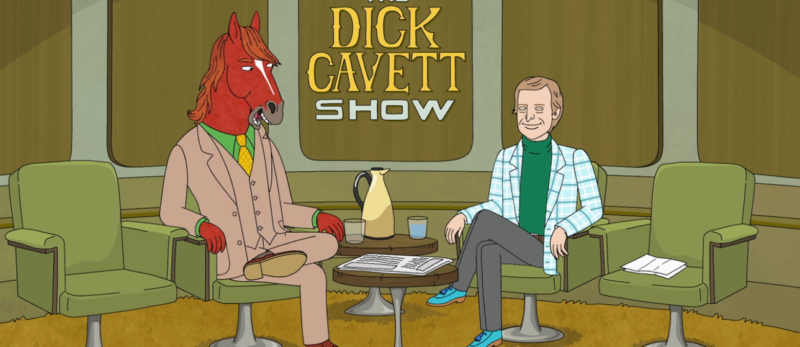

The character design of Bojack Horseman’s Secretariat is uncannily similar to the actual look of the horse in Secretariat (who they also made sure to model after the real horse.) The same long-starred nose is visible and obvious to all, but the real nod was the color choice made in Bojack Horseman’s version of the character.
Before Secretariat had his name, the Meadow Stable team nicknamed him “Big Red” for his deep auburn look. This is a name that took hold with tons of Secretariat fans as he made his rise to fame. The fact that his red and gingered colored fur/hair is so prominent was definitely an intended stylistic “pop.”
“Secretariat VS Sham”
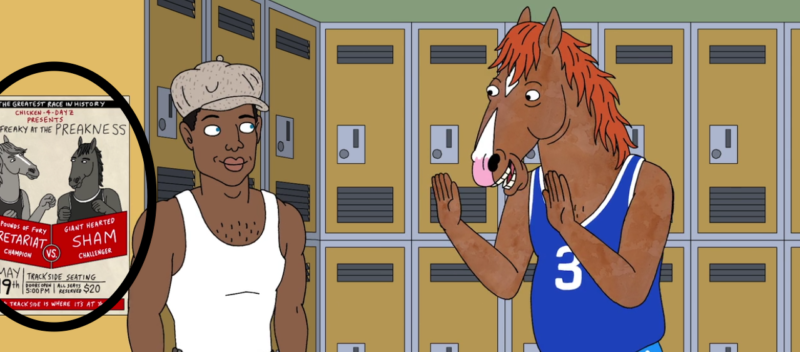
One of the neatest “Easter eggs” that appeared in S2E1 (“Brand New Couch”) during the Hollywoo retelling of Secretariat was a particular poster that was framed in plain sight during one of BoJack’s filmed scenes. A ton of factual references are made about not only Secretariat, but his racing rival: Sham.
Sham was a racehorse who went up against Secretariat in the Triple Crown races — in the actual Secretariat film, this rivalry was pumped up to be the most dramatic match-up in racing history. May 19th (1973) was the actual date of the real Preakness race. Secretariat’s epithet of being “1175 Pounds of Fury” is accurate to the racehorse’s factual weight around the time. Sham’s “Giant Hearted” epithet stems from the literal fact that his heart was measured to be about twice the size of a regular horse’s heart.
Additionally, it’s worth noting that the blue and white athletic getup BoJack is wearing throughout filming is relevant to the actual racing colors the real Secretariat wore — which were blue and white.
Hippies and Hope

At the beginning of S2E9 (“The Shot”) there’s a flashback to Secretariat arguing with President Nixon over being sent to Vietnam. In this, a bit dialogue is exchanged:
“Sir, you can’t send me to Vietnam. […] There are going to be riots in the streets. I’m Secretariat!”
“You think I’m afraid of a few rioting hippies? Don’t make me laugh.”
This may just sound like the typical notion that sports fans would lose their minds over something like this happening to a favorite player, but when given the historical context, it puts things into an entirely different perspective. During the time of the Vietnam war, Secretariat had actually become a beacon of hope and positivity during America’s internal struggle for peace. Secretariat’s effect on the public was so notable because people from any walk of life — including “hippies” — had come to see Secretariat as a symbol for unity.
The Biggest Twist of All
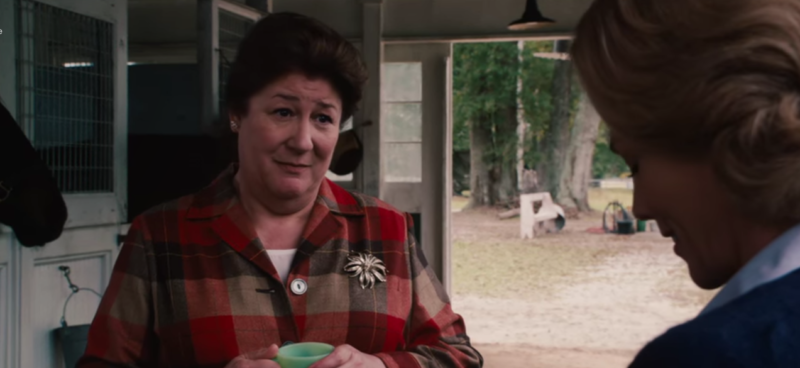
She’s always right under our noses. Anyone could be watching their favorite show, or their favorite movie, and there she is: sneaking into the fray with her incredible talent. That’s right — just when we thought things couldn’t be more intertwined, it turns out that Character Actress Margo Martindale played a starring role in the Secretariat movie.
Margo plays Miss Ham: a dutiful secretary to Penny Chenery’s father. Penny — Secretariat’s owner — begins to enter him in races with the emotional support of Miss Ham, who actually winds up giving Secretariat his very name.
Now, we know Raphael Bob-Waksberg had personally sought out Margo for a role in BoJack Horseman. The fact that she happened to have a role in the most relevant movie to the series (and to BoJack’s character) is definitely way too good to just be pure coincidence. We see you, Raph.
Our Take
Considering how BoJack Horseman delves into reality with its takes on politics, fame, and mental illness, it’s unsurprising that it would draw from real events and movies — and in the case of a few examples, a movie based on real events. The BoJack writing team couldn’t have picked a better symbolic choice for BoJack’s role model: a celebrity who runs from their problems. Granted, the real Secretariat was nothing like the one in the BoJack-verse, but the show did a great job of showcasing how “running” isn’t always necessarily the answer.
It’s little details like these that emphasize just how much love is put into the show. The time, care, and research that was put in specifically for BoJack Horseman to have a stronger symbolic nature just proves that the series itself is a Triple Crown winner among its kind.

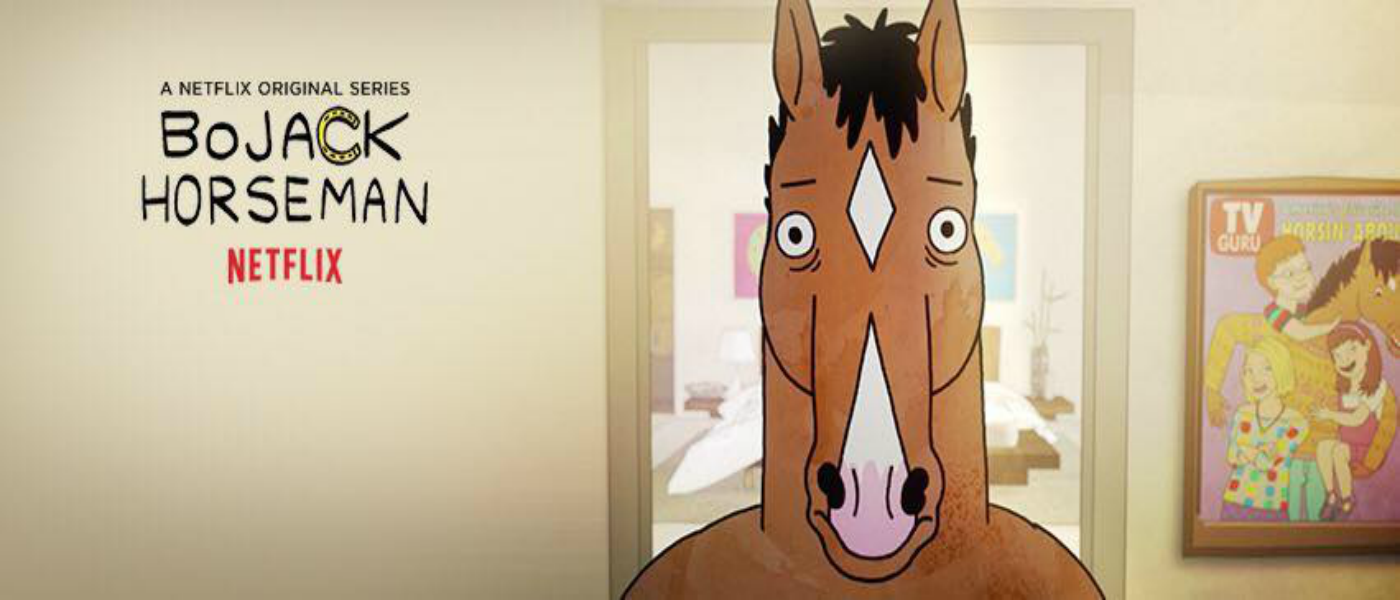


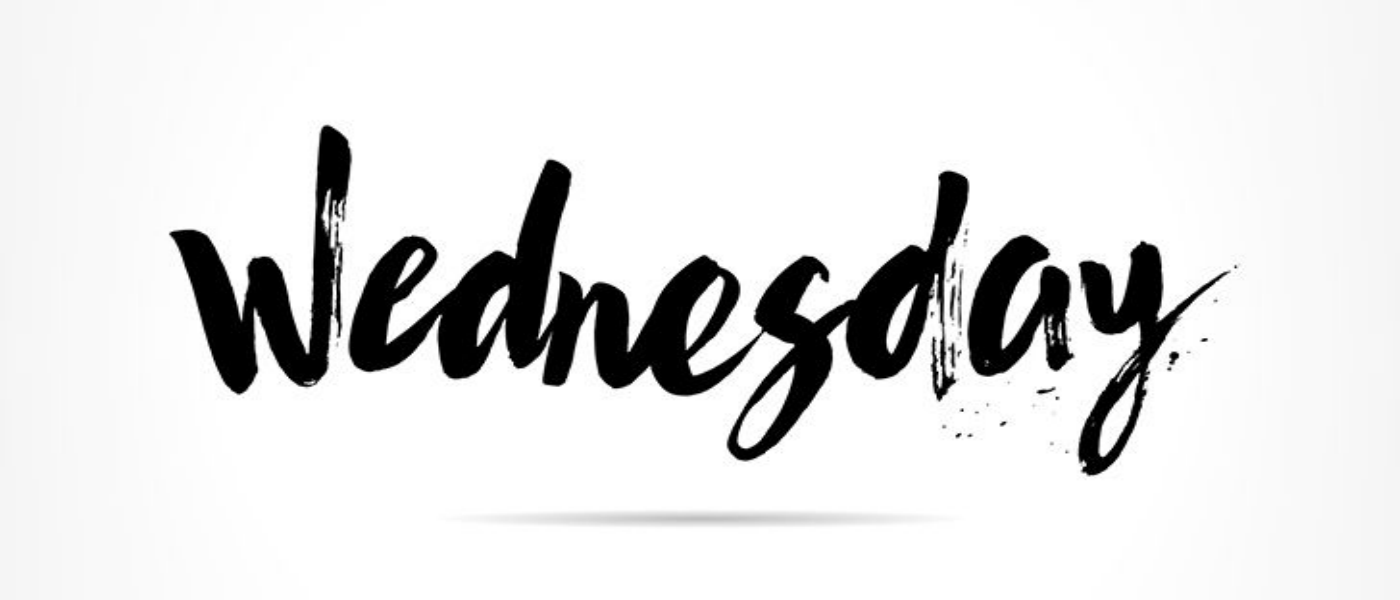











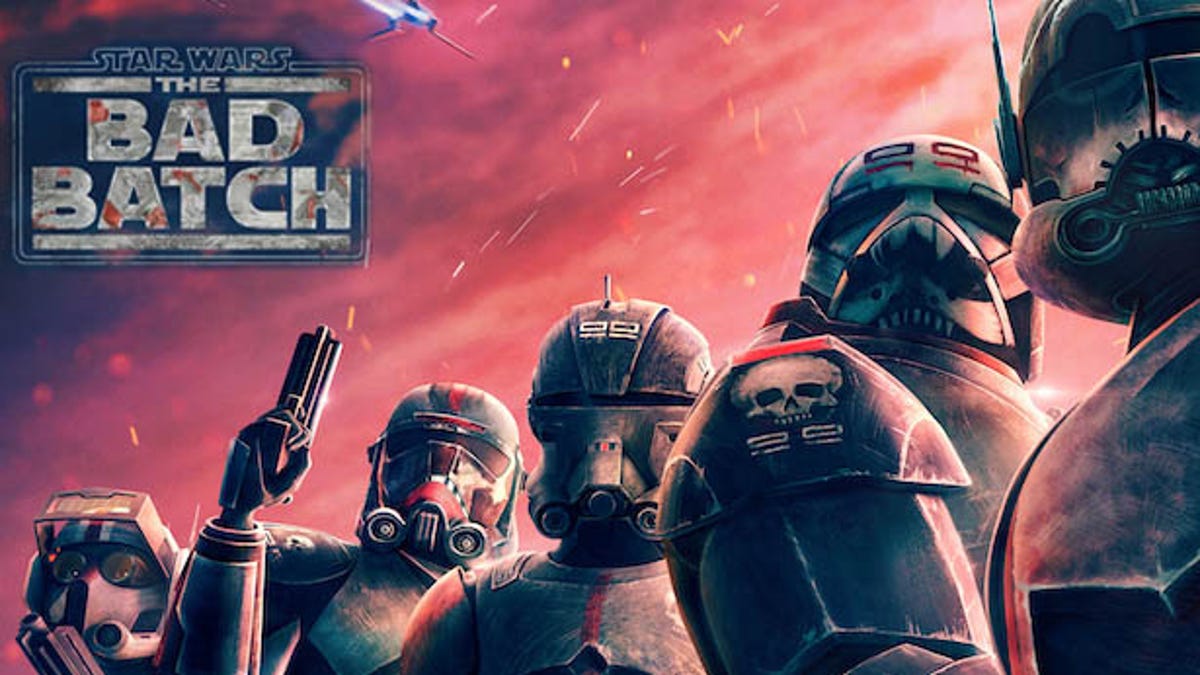









Hi Ashley, thank you so much for reading and we love the feedback. Note that on that day we had 14th posts go up and only ten posts show on the front page, so it's possible the preview had already been archived by the time you got to it. One recommendation would be to add our RSS feed to your favorite news aggregator service like Feedly, this way you get all of the latest posts!